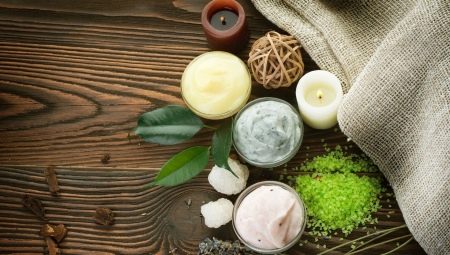A few decades ago, scientists suggested that the demand for natural cosmetics will increase. Not much time has passed, and these forecasts have already been confirmed. Most women have opted for natural compounds, as they are more beneficial for the skin, environmentally friendly and safe. The article will discuss the varieties of natural cosmetics and its best brands.
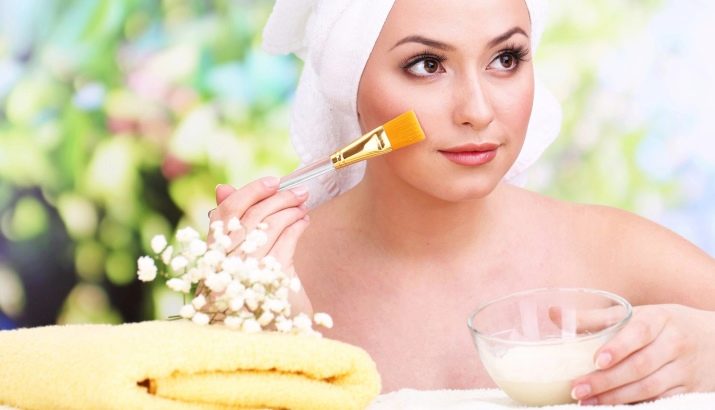
What it is?
Since ancient times, women have sought to be beautiful and have put a lot of effort in order to extend their youth. In the race for excellence, various natural care products created from herbs were used - recipes have been passed down from generation to generation for centuries and laid the foundation for creating modern cosmetics.
Most companies in our time are trying to create their skin care products as natural as possible, without harming tired skin from the frantic pace of life in urban areas.
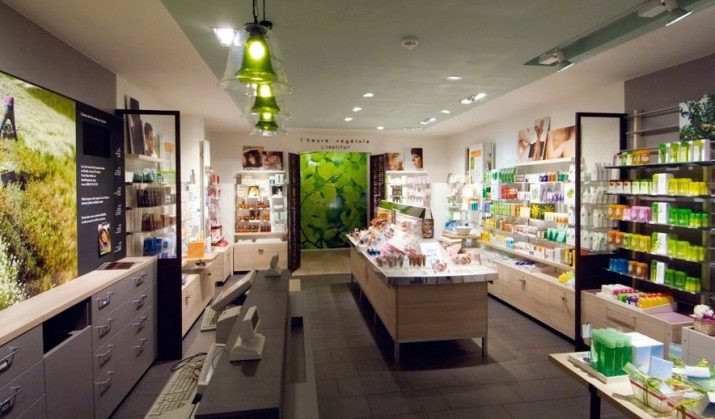
Strictly speaking, the concept of “natural cosmetics” is somewhat blurry. In theory, this can include any composition that contains plant ingredients or components of natural origin. This is often used by unscrupulous manufacturers who label the packaging of their products with the phrase "natural cosmetics", and in fact the dosage of plant components in them is very small. That is why in our days, specialists have refused to use generalized expressions and introduced such concepts as organic, eco-and bio-cosmetics into everyday life.
Natural cosmetics is significantly different from all the products that are offered in the mass market segment - in most cases, such care products are sold at specialized retail outlets or online.
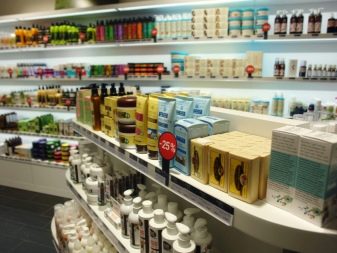
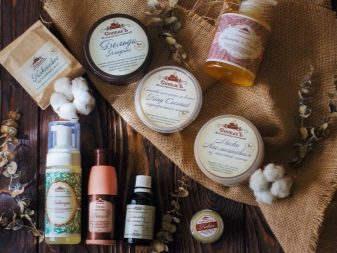
The creators of natural cosmetics claim that traditional synthetic products contain harmful chemical additives. Moreover, women do not immediately notice their toxic effects, since the first time such cosmetics really "perform" their functions. Nevertheless, artificial additives penetrate deep into the pores of the skin, causing allergic reactions and irritation. With natural cosmetics, such effects are minimized, the only thing that can cause an allergic reaction is the active ingredient itself.
In order to fall under the category of "eco-cosmetics", the content of natural components in it should not be lower than 80%.
Besides, it is crucial how sources of raw materials are grown - International standards require that plants needed to create care products be grown in ecologically clean areas without the use of hormones, antibiotics, pesticides and other substances potentially dangerous to humans.
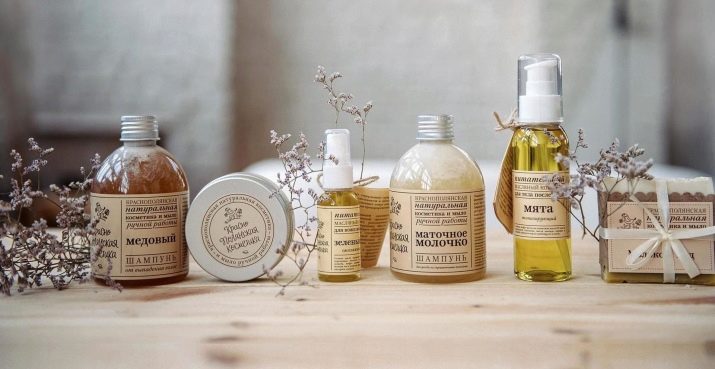
Natural cosmetics should not contain sulfates, surfactants, cosmetic flavors, as well as components of animal origin.
As preservatives used salicylic and benzoic acids, mineral salts and some natural oils.
Different countries have their own requirements for such funds. So, in Germany, the use of GMOs is not allowed. In France, the content of natural components should be kept above 95%, and in the USA they are trying to produce 100% environmentally friendly products, and if this percentage is below 70, then the product is completely banned from sale.
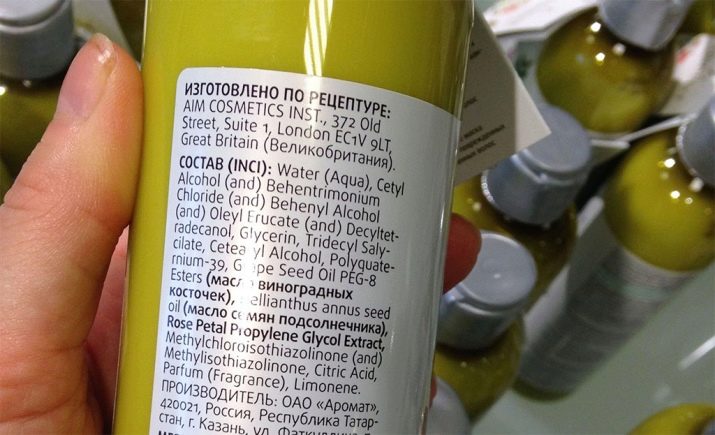
Advantages and disadvantages
Fashion for everything natural came to us in the hippie era, but today we are experiencing a real eco-boom. Even the mass market vyingly offers all new products, the creation of which uses plant components. The explanation for this phenomenon is very simple - such products are completely safe for people, because it does not contain carcinogens, chlorides, formaldehydes, as well as lanolin and alkalis.
However, with all the advantages of care products, it is necessary to understand that they do not give an instant effect.
Nevertheless, with prolonged use, the result will be truly noticeable and sustainable.
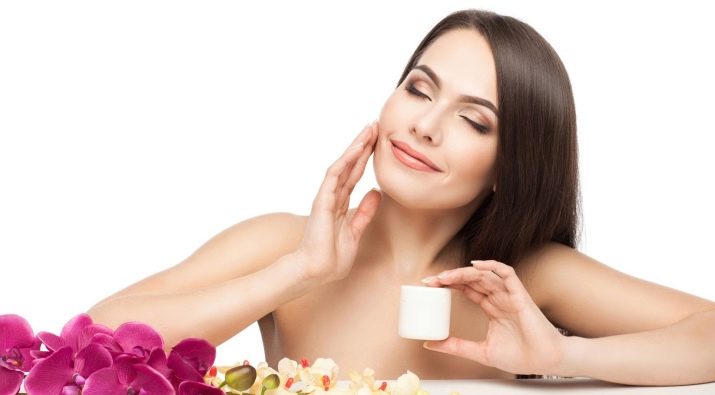
Natural cosmetics have their drawbacks. It can cause an allergic reaction. For example, citrus fruits often cause redness and irritation, so people with sensitive skin should be treated with such caution with great care. In fairness, it should be noted that reactions to the synthetic ingredients of creams and gels are much more common.
That is why, before buying a cosmetic product, it is necessary to test it. To do this, a small amount of the composition is applied to the wrist or elbow, and after 20-30 minutes the condition of the skin is assessed.
If you notice redness, a rash or swelling, then you should look for another drug for yourself.

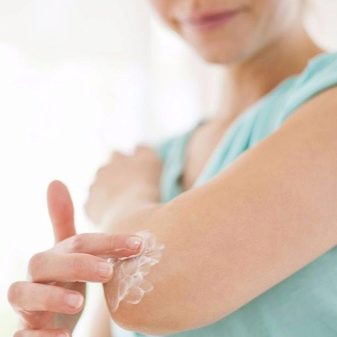
A significant drawback of natural cosmetics is that she is unable to fight the signs of aging - wrinkles, a “floated” oval face and loss of elasticity, since retinol, peptides and some acids used as antioxidants are prohibited for use in creating natural cosmetics.
The function of moisturizing the skin is not good enough. The fact is that you can add hyaluronic acid to the care complexes, but only that obtained by plant.The creators of such funds do not have the opportunity to resort to advanced technologies, they are unable to reduce the molecular weight of the substance, respectively, hyaluron does not penetrate into the deeper layers of the dermis, but only has a surface effect.
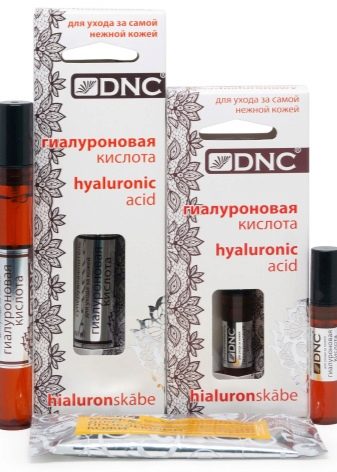
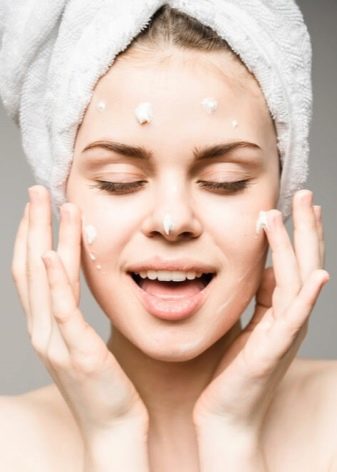
Many natural ingredients have pronounced pharmaceutical smell, which is not to the liking of the most fastidious users. Cosmetics contain a lot of oils and are often thicker than usual, so it is not as easily distributed as synthetic, distributed over the skin.
However, you should not draw premature conclusions - such funds are absorbed faster, and you need to apply them with a thin layer, so in fact the expense is more economical.
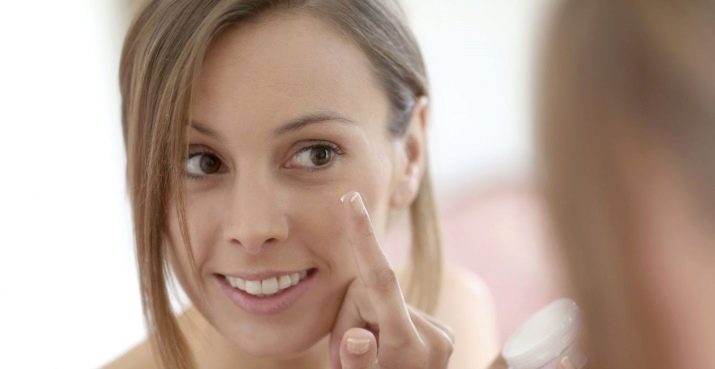
Comparison with Organic
Many believe that natural and organic cosmetics are identical concepts. This is not entirely true - there is a difference between them. We will try to understand the theory of the issue.
Manufacturers of natural cosmetics are allowed to add a small amount of mineral oils and synthetic preservatives to their preparations, their content should not exceed 20%. Many doubt the effectiveness of such funds, so they choose organic ones.
In accordance with accepted standards, the concentration of plant components in it should not be lower than 95%.
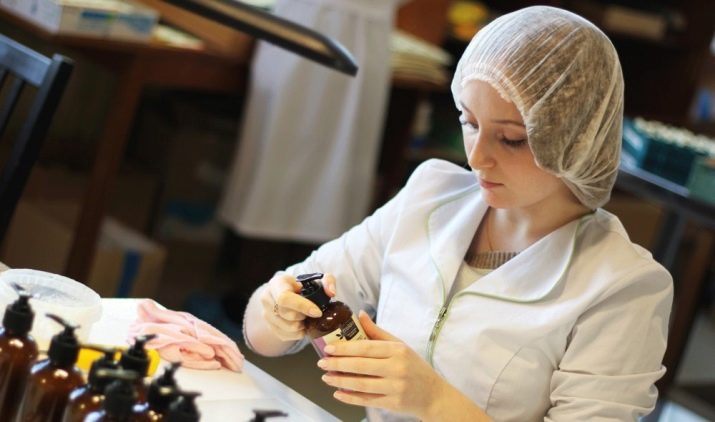
In addition, there are a number of important requirements.
- Raw materials for organic cosmetics should be grown only in ecologically clean areas and assemble exclusively by hand.
- So that all the necessary extracts are in your cream, during collection, storage and processing use special technologies.
- Organic cosmetics even packaging must be environmentally friendly - i.e. biodegradable.
- The fundamental point is that organics are never tested on animals. All studies are carried out using the “in vitro” method, that is, in vitro on fragments of hairs and skin.
- The creators of organic cosmetics especially recommend it to pregnant and lactating women. Each manufacturer offers a series for newborns to protect children from the adverse effects of external factors from the very first days of life.
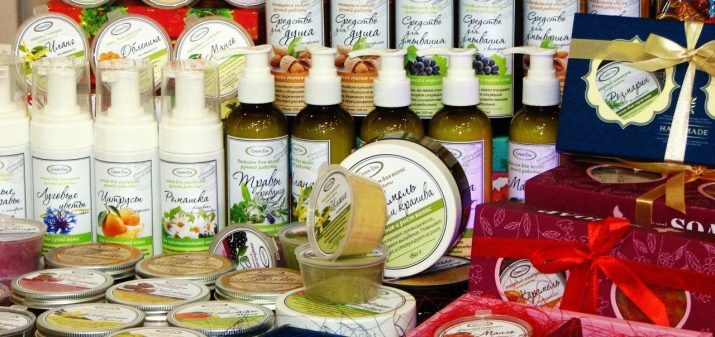
Analyze the composition
Natural cosmetics usually contain several essential ingredients.
- Extracts of medicinal plants and herbs. In most formulations, the active ingredients are extracts from chamomile, nettle, sage, wheat germ and lavender.
- Natural preservatives - here the ingredients are beeswax, rosemary extract, propolis, citric acid and vegetable alcohols.
- Nutritious oils. These components provide nutrition, hydration and softening of the skin. Typically, natural cosmetics include base oils (coconut, argan, sea buckthorn, almond, olive), shea butter, jojoba and macadamia oils are used less often.

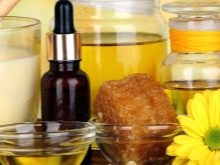
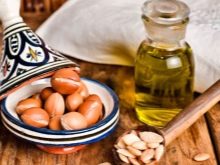
In addition to these funds, the composition of natural cosmetics also includes:
- vitamin A - it has a general tonic effect, increases the elasticity of tissues and promotes their rejuvenation;
- vitamin e - slows down age-related changes, removes toxins and toxins, effectively smoothes the surface of the skin and moisturizes the cells of the dermis;
- panthenol - belongs to the group of vitamins B, relieves dryness and peeling, provides deep nutrition, relieves irritation, eliminates inflammatory processes, soothes the skin;
- plant-based hyaluronic acid - maintains water balance in the epidermis, creates a thin film on the surface that prevents moisture from evaporating, so that the skin takes on a well-groomed appearance, turgor and elasticity are returned to it;
- allantoin - this component softens epidermal cells, promotes a pronounced anti-aging effect and removes irritation from dry and sensitive skin;
- fruit acids - obtained from plant components, used to effectively exfoliate keratinized layers of the skin.
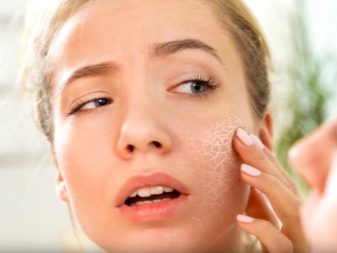
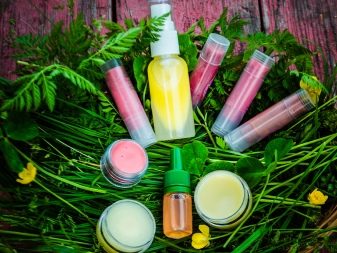
In the composition of the basic components there is no place for such ingredients as:
- GMO;
- chemicals
- oil products;
- synthetic perfumes.
- dyes.
Before buying, be sure to check the composition of the cosmetics offered to you in order to make sure that there are no undesirable components.
If the care product is made in Russia, then its composition will be indicated in Russian, all organic components are usually indicated by one or two asterisks “*, **”. The composition should be studied from top to bottom - the higher the line, the higher the substance content in cosmetics. If the ingredients are located below the 6th line, then you can not pay much attention to them.

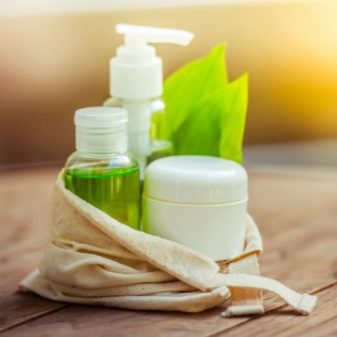
Kinds
There are several varieties of natural cosmetics.
Mineral
These compounds are based on the use of minerals and salts, which nourish and enrich the skin and hair with a large number of useful trace elements. At the production stage, stones and minerals are crushed into dust to produce particles that are 9 times smaller than powder components. Water is taken only mineral, thermal, with silver ions or silicon.
In most cases, the series is represented by medical cosmetics, which is created to solve a variety of skin problems. Semi-precious or even precious stones, which are natural antiseptics, are often introduced into its structure. The compounds effectively treat acne, relieve irritation, and reduce the appearance of acne.
Manufacturers claim that with regular use of such care products, mineral cosmetics give a lasting therapeutic effect.
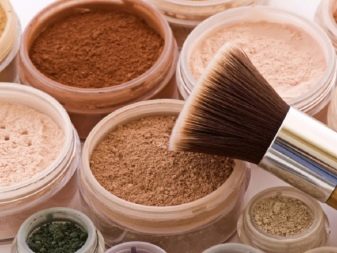
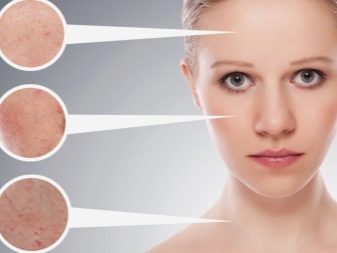
All the differences of such cosmetics are due to it is the presence of minerals. On the one hand, this is a good basis for creating peels and scrubs, since mineral powders contain natural acids and well absorb sebum. On the other hand, solid particles do not dissolve in water, so achieving a homogeneous product is not easy - they are still felt in cosmetics.
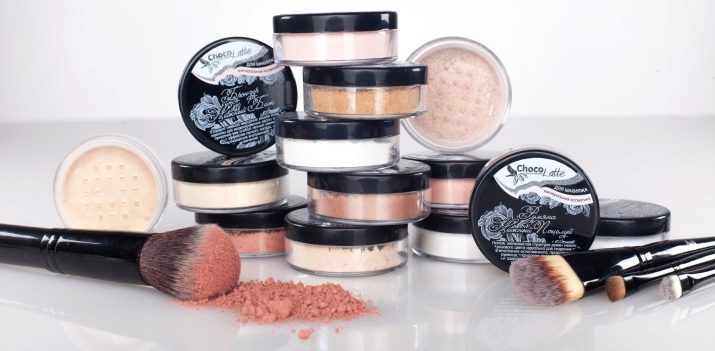
Phytocosmetics
This is the most numerous category of cosmetic formulations. Care products are created using infusions, decoctions and extracts of stems, roots, flowers and petals of medicinal herbs. All phytocosmetics can be conditionally divided into two groups: the first is created from herbs growing in Europe, and the second from Asian and exotic plants.
The advantages of phytocosmetics include the fact that it is produced only from those plants that have been studied by pharmacists for several centuries. Among the minuses can be identified the risk of allergic reactions, especially when it comes to exotic herbs - their effect on the body of a European person is not fully understood.
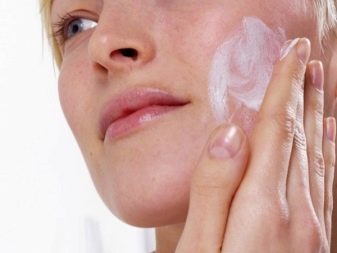
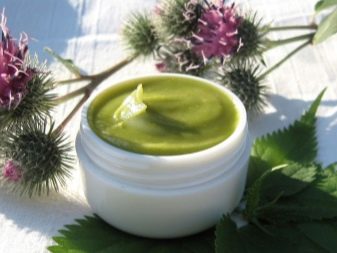
Ayurvedic cosmetics
At its core, these are the same mineral oils and herbs, but only cosmetics are manufactured in accordance with the traditions of the Indian folk health and beauty system. The advantages of such tools include centuries of experience in use and a pleasant mystical halo.
Among the shortcomings, one can point out an incredibly complex composition containing dozens, or even hundreds of different ingredients, as well as a high price tag for drugs.
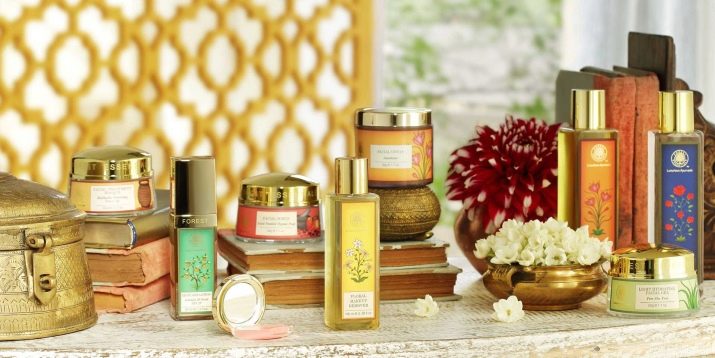
Brands
Among the most sought-after brands of natural cosmetics several brands can be distinguished.
- REN. For the production of such cosmetics, environmentally friendly products are used, thanks to which the skin is maintained in a healthy, well-groomed and radiant appearance. All cosmetics are approved and confirmed by clinical trials, do not contain toxic and synthetic additives.
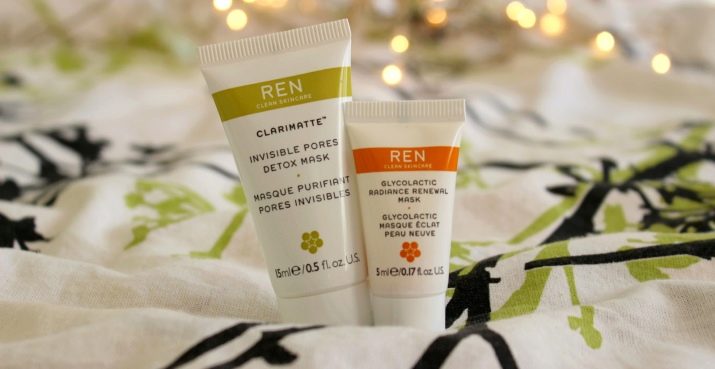
- Nude. Care products without sulfates, parabens, perfumes and preservatives. Organic ingredients provide the skin with a beautiful appearance and support their health.
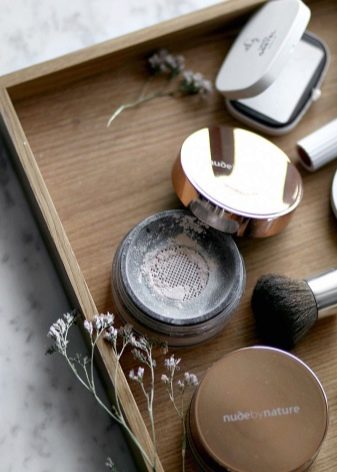
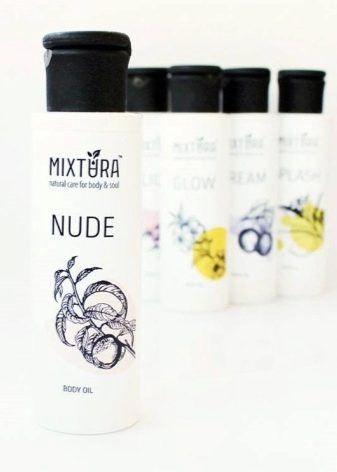
- Bare Escentuals. The brand of mineral cosmetics, whose products allow women to look more well-groomed and young. It does not cause irritation or allergic reactions.
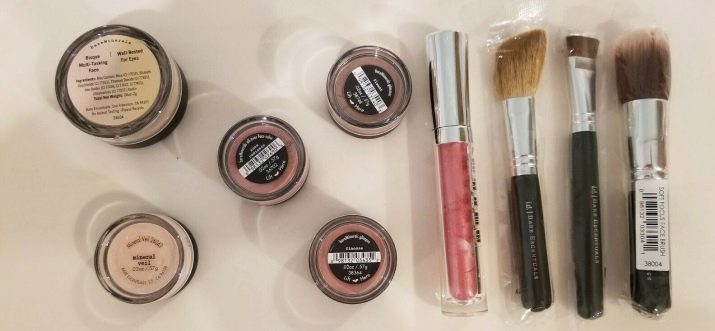
- Stella McCartney CARE. This is a relatively young brand that represents the highest quality care products.
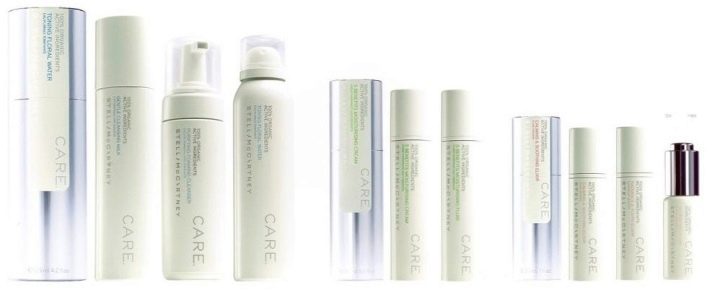
- Dr. Hauschka. A popular manufacturer of cosmetics from Germany, which takes medicinal herbs as the basis for its products. The assortment list offers the widest selection of products from cuticle care products to shampoos.
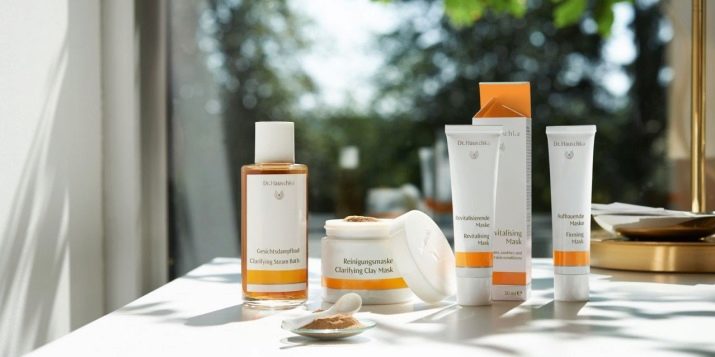
- Korres. A Greek brand that has quickly taken a leading position in worldwide sales. The hair care series is especially appreciated.
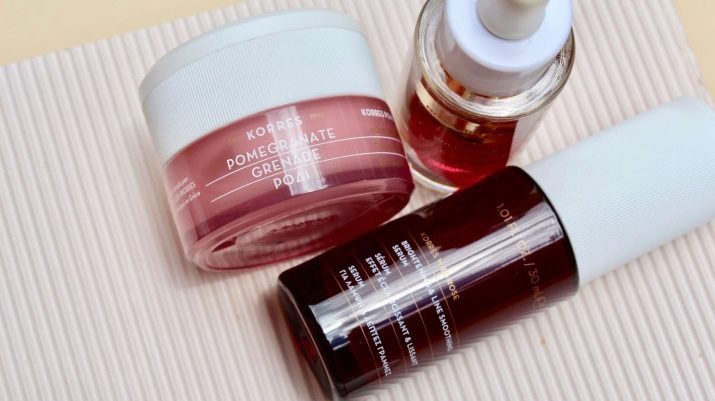
- Light organic. A brand from the USA, the hallmark of which is the use of jojoba oil, rosemary, carrots and vitamin E. All creams and serums are only handmade.
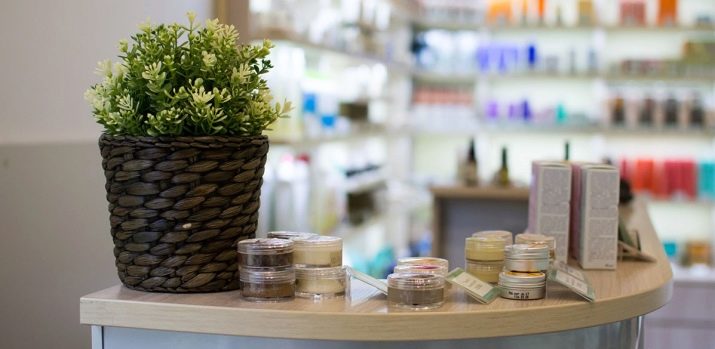
- Ojon. The main component of all cosmetics is walnut oil, which was used by the Indians. It is introduced into creams, shampoos, masks and sprays.
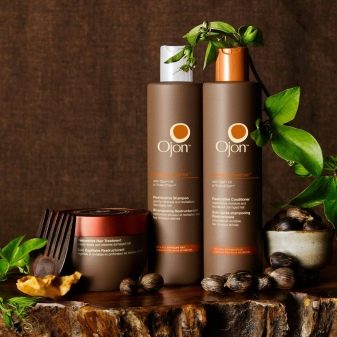
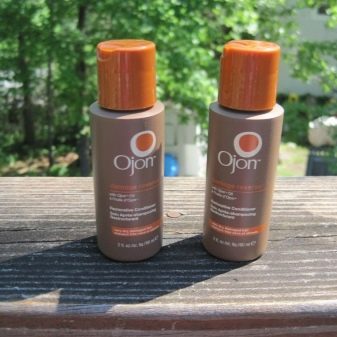
Companies' products are in demand Mi & Ko, Bielenda, “Altai Herbs”, as well as “Lavender Land” and Miss Eco.
Rating
We present a list of the most popular natural cosmetics.
- Organic shop. Cosmetics focused on young girls, although the assortment list offers a large number of peels, creams and serums, as well as masks. Especially popular is the line of care products in a black jar Organic Kitchen. Their laconic design and high efficiency are adjacent to the affordable price, and a recent advertising campaign involving beauty bloggers has fueled interest in this series of drugs.
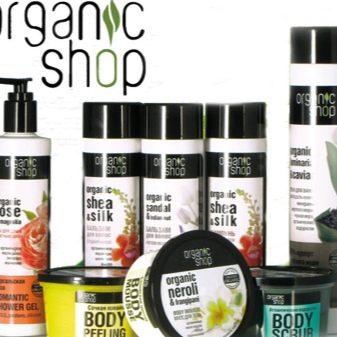
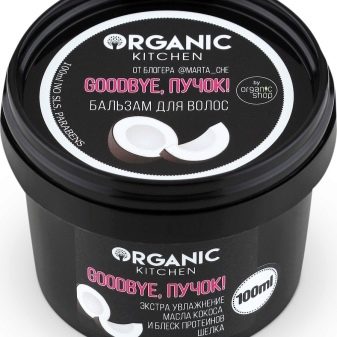
- Spivak. Initially, the company was organized as a soap factory, so one of the main products in the lineup to this day is coconut oil soap. However, today the range is complemented by a variety of skin care products of high performance. Butter manufacturers from this manufacturer are especially in demand, many users call them the best body care products.
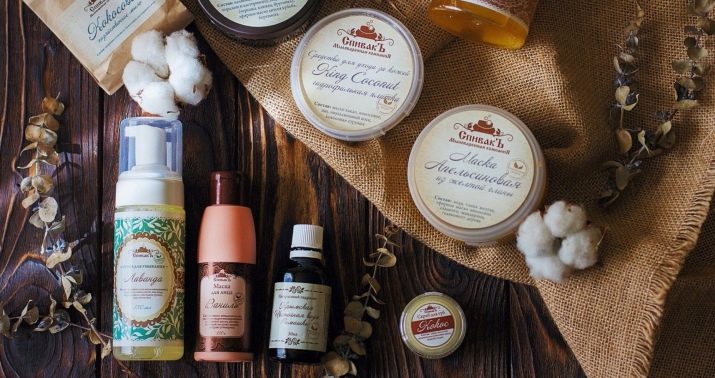
- Yves Rocher. A company that has been selling its products for health and beauty for over 50 years. The assortment portfolio includes decorative and care cosmetics based on plant extracts. The manufacturer focuses on the ethics of its technological cycle, therefore, the products are not tested on animals, and the packaging is made of biodegradable eco-material. One of the brand's best-selling products is shampoo, which contributes to the shine of hair. Such a shampoo does not foam well, which directly indicates a low content of preservatives in its formula.
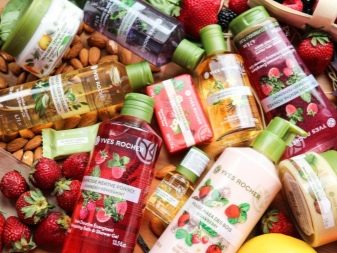

- Lush. The company is actively fighting against animal cosmetics testing, this slogan is even indicated on fabric bags that are sold in the company's distribution network. All raw materials are either grown on their own plantations, or purchased from suppliers with similar ethical principles. Bath bombs, dry shampoos and other shower products are in the greatest demand.
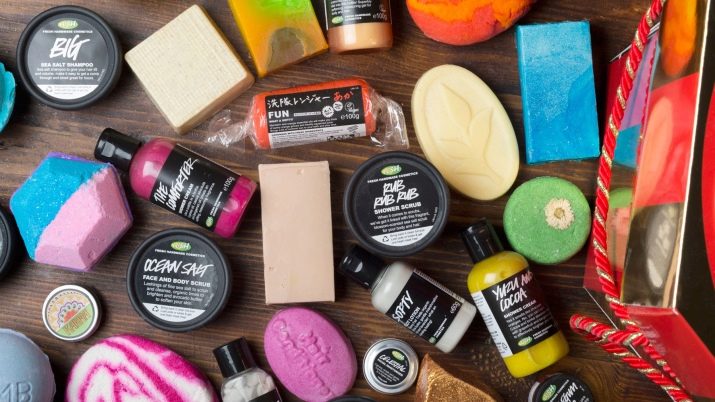
- Dr. Hauschka. A cosmetic brand created more than 50 years ago by a German chemist. All products of this manufacturer contribute to maintaining healthy skin, its regeneration and nutrition. The product line contains deep moisturizing products, formulations for atopic dermatitis, face creams and serums.
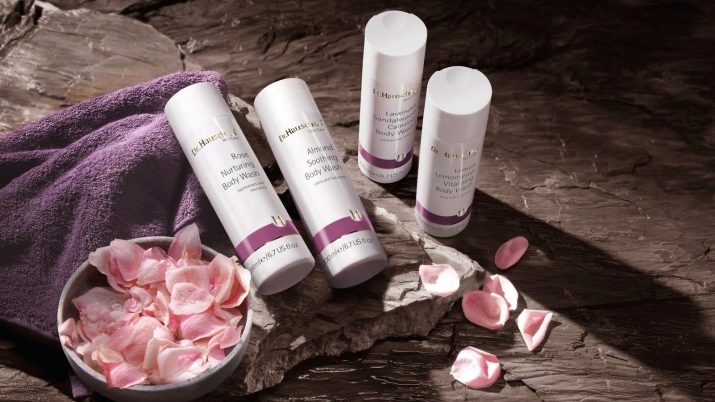
How to choose?
As you know, any popular product sooner or later faces the problem of fakes. Unscrupulous manufacturers make "green packaging", causing persistent associations with nature. In fact, the beneficial properties remain the same. In order to distinguish such cosmetics from truly natural, we suggest using the recommendations of specialists.
- When choosing natural cosmetics Require the seller a certificate of conformity from the sellermarked with the marks BDIH, NaTrue, as well as the Ecocert or Soil Association.
- Please note that certificates are issued not to the trademark as a whole, but to each specific product. This is often used by manufacturers of fakes, they produce one natural series, and then literally "stick out" their organicity, using a certificate throughout the advertising campaign.
- Be sure to check for chemical ingredients. - carefully study the composition of the goods offered to you, usually everything that ends with “en”, “ol”, “en” and “at” means chemical components.
- Check the concentration of natural ingredients in the cosmetic. Normally, they should be at least 80%, ideally - 95% and above.
- Check expiration date. All natural spoils quickly, so the shelf life of organic cosmetics usually does not exceed 1 year, and ideally 3-6 months. If you see that the manufacturer claims a long time - feel free to refuse the purchase.
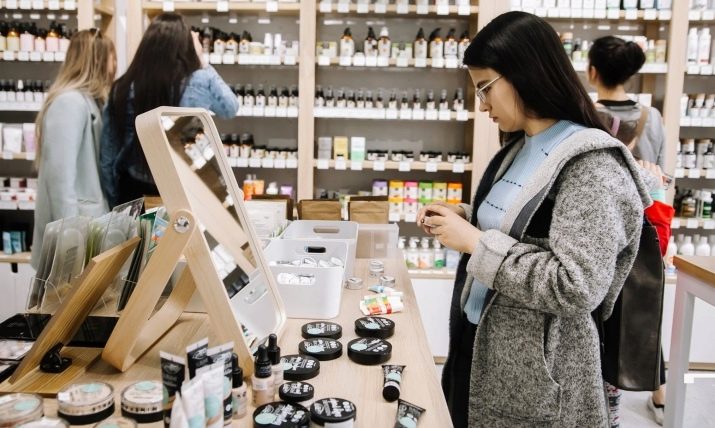
Review Reviews
Reviews of users and cosmetologists about the use of natural cosmetics are mixed. Buyers are attracted by the naturalness of the composition, environmental friendliness and ethics of products. By purchasing such cosmetics, women not only help themselves to look more beautiful, fresh and well-groomed, but also participate in socially significant business - protect animals, and also participate in recycling, thereby preserving natural wealth.
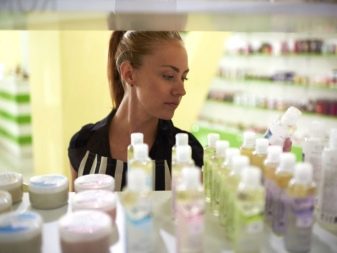
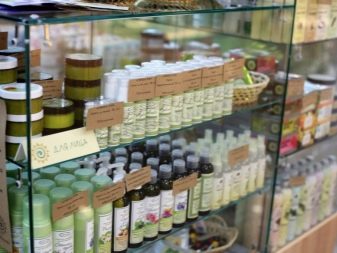
The responses indicate that natural cosmetics has a good peeling effect, contributes to the soft removal of the keratinized layer of the skin, stimulates the regeneration processes.
However, experts believe that the moisturizing and antioxidant qualities of these compounds are greatly exaggerated by the manufacturer.
The fact is that with age, the skin loses moisture, therefore, it needs to regulate the water balance. At the same time, hyaluronic acid, which is responsible for moisturizing the dermis, does not enter the skin in a way that promotes deep penetration. Accordingly, the cosmetic effect is superficial and therefore short-lived. Using natural cosmetics, you can even out the relief and improve complexion, remove traces of fatigue, but it is impossible to deal with the ongoing processes of age-related changes with the help of organics.
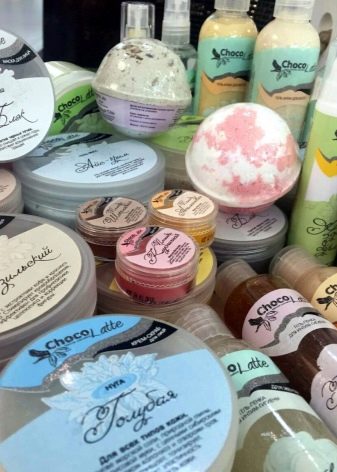
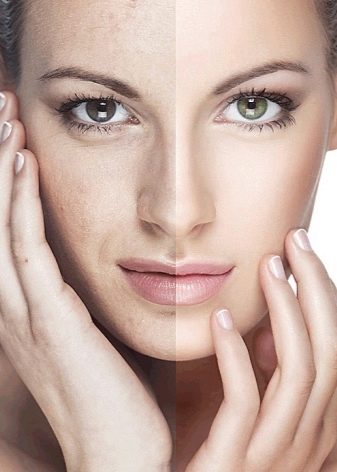
On how to distinguish natural cosmetics from pseudo-natural, see below in the video.
